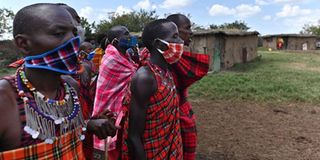Culture and the arts: Why we’ll remain children of two worlds

What you need to know:
- Taboos like murder, incest, witchcraft and harlotry are expressly forbidden both by law and religion.
. Nobody can argue persuasively that many of the customs our forefathers held dear have any positive role in our lives today.
Last week, I wrote about the erosion of our culture and obfuscation of the African identity by influences from without, and why reclaiming traditional values is an uphill task. I cited the way some of us lads were submerged into other people’s culture through “soft power” tools like spaghetti westerns projected on huge screens by an outfit known as Factual Films Ltd. In the 1960s-70s, Factual Films were “the sole provider of free mobile cinema services in Kenya” and they brought joy to villagers every fortnight.
The problem is that these movies warped my sense of judgment through stereotyped visual brainwashing at a very tender age. Such sugar-coated indoctrination continues in many guises today, except that the watoto kaeni chini generation is a lot older now, and aware that the forces of evil do not always wear black sombreros or colourful feathers. Nor do the angels wear beige Stetsons.
We know for sure that something is definitely wrong when we lament endlessly that we Africans are in danger of losing our traditions... and use borrowed tongues while doing so. We have lost it when we realise the only expression of this culture are traditional dances rendered by lesso-clad women during political rallies, mugithi nights, and elaborate traditional circumcision rites.
DEEPLY WESTERNISED
What we don’t recognise is that that we have been so deeply westernised there is no hope, ever, of reclaiming the lost glory of traditional life.
I have no problem with those who try to claw back what is left of their cultural traditions. There is no harm in it, provided it is not against the law—early marriages and FGM are certainly in that category, and so are, quite absurdly in my view, traditional brews.
Taboos like murder, incest, witchcraft and harlotry are expressly forbidden both by law and religion. Nobody can argue persuasively that many of the customs our forefathers held dear have any positive role in our lives today.
The desirable ones remaining are quite harmless, though. Nobody would argue with the meaning behind many of the practices associated with marriage -- formal betrothal (uthoni), bride-price negotiations (ruracio), weddings and even burials. Christian religious practices and customary beliefs have meshed so that nobody really complains about wounded sensibilities anymore. Some such practices have turned into business, and you might even come across digital-savvy “Maasai warriors” dancing themselves silly to entertain tourists. If naïve wazungu are ready pay top dollar for such stuff, where is the harm?
IDENTITY ISSUES
What I am saying is that there is no authentic African culture left. We must embrace the fact that we are all children of two worlds. Where we have gone wrong is to nimble at identity issues inconclusively. Should we, for instance, change our official mode of communication from English to Kiswahili?
Should we stop wearing suits and revert to mythical national attires? Should we abandon foreign cuisine in favour of traditional dishes? None of this will happen in our lifetime and we shouldn’t waste too much time on such things.
All my life, I have been in love with the written word, which is why I chose to study Literature. In retrospect, that was a silly choice, for the course turned out to be unmarketable. Having gone through a British-influenced education system until the final years of secondary school, I was familiar with notables like George Orwell, Charles Dickens, and William Shakespeare, before I had read the first book by great Africans writers like Ngugi wa Thiong’o, Chinua Achebe, Wole Soyinka, and the celebrated Chimamanda Ngozi Adichie. That was wrong.
LITERARY GIANTS
Later still, I was to get acquainted with the American literary giants of the last century like Ernest Hemingway, Mark Twain, James Baldwin and Maya Angelou. Don’t ask me about the greatest American writers of this century, for I have no idea. It’s been years since I studied any book in depth, except those by my contemporaries.
I am into action-packed spy novels, whodunnits, historical thrillers and biographies. I walk in the same streets with writers like Lee Child, Dan Brown, John le Carre, Joseph Wambaugh, and of course, the inimitable Jackie Collins. However, I wouldn’t advise would-be literary scholars to follow that route.
There is a great deal to learn from veterans like Francis Imbuga, Margaret Ogola, and younger writers like Kinyanjui Kombani, and Yvonne Owuor. When they hit 60 and realise they can’t get excited about any issue whatsoever, they can then delve heavily into pure escapism like I do.
Mr Ngwiri is a consultant editor; [email protected]





